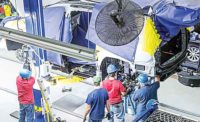Based in Somerset, KY, Toyotetsu America (TTA) is an automotive stamping division of Toyota. TTA operates several plants, including one in Sincoe, ON, since 2007. There, workers stamp metal frame parts for cars such as the RAV4, Corolla and Lexus.
The parts are stored in plastic boxes or hand totes, depending on weight and size. For several years, workers continuously drove electric tow vehicles (called tuggers) down aisles to retrieve parts, place them inside the vehicles’ trailers, and bring them to the welding area for assembly.
But in August 2011, Andy Elkin, production control manager for Toyotetsu America, and his team learned that Toyota planned to significantly increase its production of certain models—and that the Sincoe plant needed to likewise increase its parts production. Elkin also realized that this growth would require more area for parts storage and less space for aisles.
“We’re anticipating a two-fold increase in the number of parts Toyota wants us to build,” says Elkin. “And that meant we needed a system that would save space, increase storage density and move parts efficiently.”
To meet these challenges, the Toyotetsu management team met with Brian Pollack, president of Northstar Industries, which distributes roller flow rack systems made by UNEX Manufacturing Inc. Northstar created a prototype custom flow rack system for TTA, and then tested the product flow to make sure the design met TTA’s needs.
After the final system was approved, TTA staff did the installation, and UNEX trained TTA staff on ways to optimize system performance. Its design eliminates one aisle by doubling rack length, tightening up spaces between roller chutes, and integrating with an existing flow rack system.
“Floor space increased 10 percent, and a lot of racking became a bilevel storage area,” says John Wall, production control assistant manager for Toyotetsu America. “Overall, we gained enough extra storage to accommodate a 30 percent increase in business.”
Kaizen, or continuous improvement, is the norm for many Japanese-owned facilities, and TTA is no exception. Because the flow racks are made of portable material and are easy to assemble and reassemble, they allow the company to make continuous, incremental improvements to its storage systems as business evolves. Just as important, says Elkin, the racks allow TTA to maintain the Toyota production system: run small batch sizes and deliver product frequently.
Tuggers are now operated on a 30-minute cycle, rather than continuously. During this time frame, workers must get into the pick area, identify the parts they need, place the parts on the cart and move them to the welding area safely and accurately.
“The racking provides a designated storage area for every part, and bins are clearly marked with key product characteristics,” says Elkin. “Team members are able to find what they need and keep the job moving forward.”
For more information on flow rack systems, call 800-695-7726 or visit www.unex.com.







